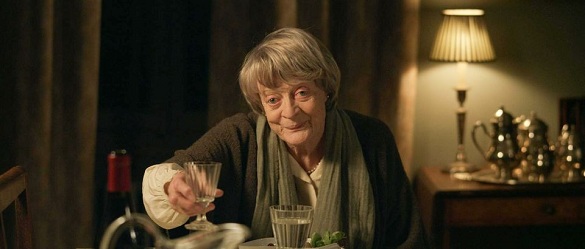LFF 2014: My Old Lady ***
Never mind mansion tax, what if you had a lodger who could live in your inheritance until their death by law – and you had to pay them rent? This quaint piece of French jurisdiction known as a ‘viager’ is the premise for respected playwright Israel Horowitz’s screen adaptation of his successful play, My Old Lady. It’s crying out to be explored in some kind of neurotic farce – and with Kevin Kline and Maggie Smith on board that’s what you think you’re in for. In fact, the film turns into something much darker and sinister in the second half that you wonder what you’ve tumbled into.
Penniless writer and general pessimist Mathias ‘Jim’ Gold thinks his luck has changed after his estranged father dies and leaves him an apartment in the cultural and much desirable Le Marais district of Paris. The trouble is there is a viager in the shape of a formidable 90-year-old woman, Brit ex-pat Mathilde Girard (Smith) who is allowed to live in it until she dies. And she’s entitled to demand rent from her new ‘landlord’ in the meantime.
Mathilde used to be the apartment’s owner before Gold’s departed dad too, meaning even more of a connection to the place. Gold’s plan is to sell it to a wealthy real estate businessman who wants to turn the whole building into a boutique hotel. However, there’s another stumbling block – Madame Girard’s daughter Chloé (Kristin Scott Thomas) who also lives there and is in no hurry to budge. Secrets and lies begin to surface, with Mathilde at the heart that promise to change proceedings dramatically.
Feeling very much like a play with long dialogue, single shots and posturing, Horowitz’s film offers nothing particularly new. This isn’t a problem in itself as his writing is sublimely brought to life and teased by Kline and Smith’s interpretation, especially in their tête-à-tête scenes, with Smith privileged to get some of the best parting shots. This sets things up deliciously for the supposed all-out battle to come. Even Scott Thomas’s injection of retorts and explosions just add to the whole Gaelic flavour and colour.
What is quite unsettling is where the story ventures, from black comedy to bleak diatribe for certain characters, supposedly being ‘straight-talking’ but tarnishing the goodwill first invested in the film. The revelations come left, right and centre as Smith struggles to keep her character amicable so that we still hold a shred of empathy for her and the resultant situation. There is even the odd scene to try and ‘lighten the load’ with an opera singer moment by the Seine. The unevenness is made worse by a sugary ending when the fallout would be too significant for things to be that peachy, testing plausibility.
This is not to say the acting is not first class – it is. Kline comes off the best (Smith and Scott Thomas superbly play to type, as expected). The actor delivers his finest work yet, going to some dark places in the process, considering his usual jester-like roles. Kline effortlessly switches between episodes of sardonic wit to moments of morose self-depreciation. It is an accomplished performance, even if it sideswipes you. The only oddity is his budding relationship, and how he gets from A to B? There feels like something vital missing in the characterisation, hence the ending feels forced, perhaps in order to retain order in such lush surroundings.
Horowitz’s directorial debut is genuinely encouraging and indulging in parts, hardly surprising given his knack for writing about human interaction, for example, New York, I Love You (2008). Whereas he was limited in screen-time for each slice of relationship drama in that film, he has space to explore in My Old Lady. It is the change in tonal direction that feels disconcerting and difficult to reconcile, however, great the performances achieved are.
3/5 stars
By @FilmGazer
